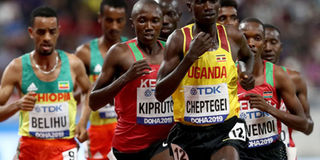IOC: No ‘ideal’ solution for Tokyo Olympics amid athletes concerns

Uganda’s distance runner Joshua Cheptegei, the favourite for Tokyo Olympics gold in 5000m and 10000m races, has his best chance to strike gold in uncertainty over the coronavirus.
Tokyo- Olympic chiefs acknowledged Wednesday there was no “ideal” solution to staging the Tokyo Olympics amid a backlash from athletes as the deadly coronavirus pandemic swept the globe.
“This is an exceptional situation which requires exceptional solutions,” an International Olympic Committee spokesperson said after criticism from top athletes that they were being forced to take health risks should the July 24-August 9 Games go ahead as scheduled during the COVID-19 outbreak.
“The IOC is committed to finding a solution with the least negative impact for the athletes, while protecting the integrity of the competition and the athletes’ health.
“No solution will be ideal in this situation, and this is why we are counting on the responsibility and solidarity of the athletes.”
Olympic pole vault champion Katerina Stefanidi and British heptathlete Katarina Johnson-Thompson had earlier both voiced concerns after the IOC said it was “fully committed” to running the Games as scheduled from July 24.
Stefanidi, one of Greece’s most prominent athletes, was scheduled to hand the ceremonial flame to Japanese officials before the Greek leg of the torch relay was scrapped over coronavirus, which has 194,000 cases with 7,873 deaths, across 150 nations as of Wednesday.
“The IOC wants us to keep risking our health, our family’s health and public health to train every day?” she tweeted. “You are putting us in danger right now, today, not in four months.”
‘Zero risk consideration’
On Tuesday, minutes before the IOC statement, the Euro 2020 football tournament was delayed for a year, bowing to the crisis that has paralysed Europe and drastically curtailed international travel.
Olympic qualifying tournaments are among the swathe of sports events that have been cancelled or postponed, with only 57 per cent of athletes booking their places so far.
“It’s unbelievable,” said Stefanidi. “What about team sports that have to train together? What about swimming? What about gymnastics that they touch the same objects?
“There is zero consideration of the risk they are putting us in right now.”
Johnson-Thompson, the world heptathlon champion, criticised the IOC for telling athletes to train “as best they can,” saying it was at odds with stringent government health measures.
‘Bigger than the Olympics’
Doubts are increasingly being expressed about holding the Olympics on time, after the outbreak that first exploded in China spread to Asia and then worldwide.
Yesterday, an Olympic gymnastics qualifier in Tokyo became the latest competition to be cancelled. A day earlier, the deputy head of Japan’s Olympic committee said he had tested positive for coronavirus.
But the IOC insisted “there is no need for any drastic decisions at this stage”, adding that “any speculation at this moment would be counter-productive”.
Hayley Wickenheiser, a Canadian IOC member, warned “this crisis is bigger than even the Olympics”.
“The uncertainty of not knowing where you’re going to train tomorrow as facilities close and qualification events are cancelled would be terrible if you’ve been training your whole life for this,” she said in a statement.
Wickenheiser added: “I think the IOC insisting this will move ahead, with such conviction, is insensitive and irresponsible given the state of humanity.”
Olympics as planned
July 24 - August 9 – Tokyo, Japan




